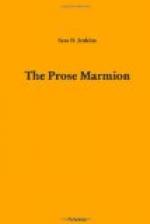“One touch to her hand,
and one word in her ear,
When they reach’d
the hall door, and the charger stood near;
So light to the croupe
the fair lady he swung,
So light to the saddle
before her he sprung!
’She is won! we
are gone, over bank, bush, and scaur;
They’ll have fleet
steeds that follow,’ quoth young Lochinvar.
“There was mounting
’mong Graemes of the Netherby clan;
Forsters, Fenwicks,
and Musgraves, they rode and they ran;
There was racing and
chasing on Cannobie Lee,
But the lost bride of
Netherby ne’er did they see.
So daring in love, and
so dauntless in war,
Have ye e’er heard
of gallant like young Lochinvar?”
The monarch hung over the wily singer, and beat the measure as she sang. He pressed closer, and whispered praises in her ear. The courtiers broke in applause, the ladies whispered, and looked wise. The witching dame, not satisfied to win a King, threw her glances at Lord Marmion. The glances were significant, familiar, and told of confidences long and old between the English lord and his countrywoman, guests of a Scotch King, on the eve of a great conflict between the two countries.
The King saw their meeting eyes, saw himself treated almost with disdain, and darkest anger shook his frame, for sovereigns illy bear rivals in word, or smile, or look. He drew forth the parchment on which was written Marmion’s commission, and strode to the side of brave Douglas, the sixth who had worn the coronet of Angus. The King stood side by side with this brave Scotsman, who had been madly watching the pageant, the fire flashing from his stern eye. This very day he had besought his King to withdraw from the coming war, only to call forth the reproaches of his ungrateful ruler. Yet at this moment, James felt a pride in standing by the side of Bothwell’s Lord, and placing in his custody Marmion, the flower of English chivalry.
“The Douglas’
form, like ruin’d tower,
Seem’d o’er
the gaudy scene to lower:
His locks and beard
in silver grew;
His eyebrows kept their
sable hue.
Near Douglas, where
the monarch stood,
His bitter speech he
thus pursued:
’Lord Marmion,
since these letters say
That in the North you
needs must stay
While slightest
hopes of peace remain,
Uncourteous speech it
were, and stern,
To say—Return
to Lindisfarne—
Then rest you in Tantallon
Hold;
Your host shall be the
Douglas bold,
A chief unlike his sires
of old.
He wears their motto
on his blade,
Their blazon o’er
his towers display’d;
Yet loves his sovereign
to oppose,
More than to face his
country’s foes.
And, I bethink
me, by St. Stephen,
But e’en this
morn to me was given
A prize, the first fruits
of the war,
Ta’en by a galley
from Dunbar,
A bevy of
the maids of Heaven.
Under your guard these
holy maids
Shall safe return to
cloister shades.’”




